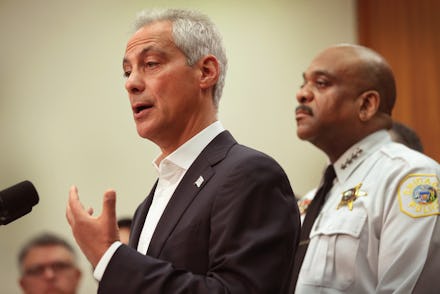Chicago is suing the Trump administration over its policies on sanctuary cities

Chicago Mayor Rahm Emanuel is digging in his heels in the fight against President Donald Trump’s policies on so-called sanctuary cities, and other threatened municipalities might soon follow his lead.
During a Sunday night press conference, Emanuel announced that the city of Chicago plans file a federal lawsuit on Monday in an effort to stop Trump and the U.S. Justice Department from holding crime prevention grants hostage from cities that don’t comply with federal immigration enforcement policies.
The suit, which two outside law firms helped the city to file on a pro-bono basis, contends that the new qualifications for cities to receive public safety grants are unconstitutional.
“Chicago will not be blackmailed into changing our values, and we are and will remain a welcoming city,” Emanuel said during the press conference, according to the Chicago Sun-Times.
This isn’t the first time a city has pushed back against Trump’s threats to refuse federal funding. In April, months after the president signed executive orders targeting sanctuary cities including New York, Los Angeles, Chicago, Miami and Philadelphia, the city of San Francisco filed two lawsuits against the Justice Department, with a federal judge from the city eventually issuing a temporary injunction against the president’s executive order.
Now, Chicago is mounting a renewed offensive against the Trump administration’s threats to cut off federal grants — and the city isn’t alone. On Sunday, California Gov. Jerry Brown told NBC’s Chuck Todd on “Meet the Press” that he also supported the idea of a lawsuit challenging the president.
“A few judicious forums to resolve this dispute between the federal government and California — I think — can be very helpful for the whole country, and in a dispassionate way,” Brown said during the interview.
According to a report from the Sacramento Bee, California Attorney General Xavier Becerra is indeed eyeing a lawsuit similar to the one Chicago filed against the Justice Department.
“The cities and states affected by these provisions have strong arguments to make in court that these conditions are illegal,” one former Justice Department official familiar with the matter told the Bee. “If Congress wanted these requirements to be part of the grant funding decision, they would have written it into the law.”
When asked about the Chicago lawsuit during a Monday press conference, New York City Mayor Bill de Blasio said that he is prepared to join in legal actions as soon as a “specific effort to withhold [federal] funding” presents itself.
”So far there has not been any funding withheld,” de Blasio said, “so our message is if funding actually starts to be withheld then we will take legal action.”
In an emailed statement, Ajeenah Amir, deputy director at Philadelphia’s Office of Grants, said that the Chicago lawsuit had also prompted the office of Philadelphia Mayor Jim Kenney to “evaluate [its] options,” but declined to specify if a final decision had been made on whether or not to pursue litigation.
When asked for comment on the Chicago lawsuit, Department of Justice spokesman Ian D. Prior told Mic in an emailed statement that Emanuel’s priorities were out of line.
“In 2016, more Chicagoans were murdered than in New York City and Los Angeles combined,” Prior said. “So it’s especially tragic that the mayor is less concerned with that staggering figure than he is spending time and taxpayer money protecting criminal aliens and putting Chicago’s law enforcement at greater risk.”